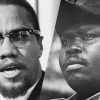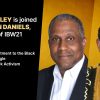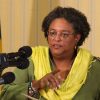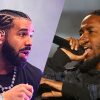
Admit it: When you finally tuned out (or logged out) of this past Sunday night’s Democratic presidential-primary debate in Charleston, S.C., you walked away with the distinct feeling that black people have only one or two issues to worry about.
Watching headlines and candidate sound bites, the nation might be under the impression that the only things black people are pressed about are traffic stops gone bad, gun-blazing cops and getting dissed in Oscar nods. But the issues are varied, numerous and complex. Despite assumptions, black folks—tax-paying and family-raising—are just as stressed by the sorry state of K-12 education for their kids, the scarcity of jobs, tight wages, access to high-quality health care, Social Security, economic displacement and all of the above. Now repeat.
And black voters are as savvy and discriminating about those issues as any other group. The most recent YouGov-Economist poll (pdf) found black voters ranking issues like Social Security, the economy and health care on their top 3 list (true: YouGov might want to throw police brutality on the list, just to see how it compares). That’s been firmly consistent throughout this cycle, with Medicare, Social Security (yes, you really need to watch that reliable black senior vote, fam) and education, in particular, getting very high numbers among black election watchers.
But watch how presidential campaigns and the Fourth Estate actively sterilize the notion of any comprehensive, multi-issue black agenda. In case you didn’t notice (or don’t live it), there is one. The problem, though, is that candidates don’t want black people (or their white friends) to know it. Particularly the Democratic candidates, who—after many forced tooth extractions—begrudgingly offer placating shoutouts to Black Lives Matter and then yell “Police reform!” for exit claps and giggles.
Yet many black people, hit with high poverty, unemployment and underemployment, are just focused on the details of getting by. Old, middle-aged and millennial. Most of them, who on average lack assets or multigenerational wealth, wonder about the next paycheck, the level of that worry determined by their place on the income scale. Few, if any, are hearing any presidential candidate talk about it. South Carolina, as an example of what wasn’t discussed recently, has a black below-poverty rate of 30 percent (nearly double the overall state rate, more than double the white rate). You’d think that someone onstage in Charleston might have had some sense to mention it.
Still, as in other major primary states where black voters (turning out or not) will be the key to nomination dreams, it’s both their large numbers and the vast range of issues that confront them. Neither Democrats nor Republicans, however, dare get into the weeds on that topic, even though Republicans are less expected to do so, since they don’t have an active black primary base to answer to.
“On the economic front, blacks have been devastated by and have not recovered from the effects of the housing crisis and the Great Recession,” argued Maya Rockeymoore of Global Policy Solutions in a scathing post-debate statement circulated Monday. “Yet, there were no debate questions about the candidates’ plans for creating jobs, addressing predatory lending, reversing the drop in homeownership rates, expanding Social Security, or closing deeply disturbing poverty, income and wealth disparities experienced by black Americans.”
It’s that deliberate oversight that’s giving this trite horde of White House contenders very dangerous room to avoid needed talk on everything troubling black people. It’s not as if those concerns are as widely covered as they should be in the first place. And even on the off chance that a major outlet hosts an exclusive black-and-brown-focused forum, channel-flipping viewers can barely find it or know that it happened.
That’s all by design. Just dare the network moderators to even ask about poised Supreme Court assaults—as we speak—on voting rights, affirmative action and labor rights. Or make any comment about red-state legislatures and governors deliberately reshrinking black political power.
Just because these issues aren’t illustrated in a viral video or don’t get assigned a hashtag or a social media feed with a million-plus visitors doesn’t mean they’re not happening. And it sure doesn’t mean that we let the candidates off the hook when it comes to talking about them. The strange, really off-putting thing about Sunday’s debate was the contemptible rejection of black electoral presence in a battleground Southern state that’s full of it. Black voters account for over half of all Democratic primary voters in the Palmetto State. As they do in states that Democrats will need not only need in the primary but eventually in the general election, too.
It’s clear, from watching that debate and assessing months of general discourse on the state of black America, we’re getting trapped into a sense of black people collectively as a monolithic one- (maybe two-) issue voting pony. That doesn’t mean police reform (and related topics) and gun violence aren’t important topics. They are. But we sorely need essential Q&As between journalists and candidates on crucial foundation issues and the plight of our hood. Don’t let candidates simply yell “Black lives do matter” so that they can pass their black Twitter litmus test, pet the pony and then move on. It shouldn’t work like that—and if you want influence in politics, it never really does.
Charles D. Ellison is a veteran political strategist and a contributing editor at The Root. He is also Washington correspondent for the Philadelphia Tribune, a frequent contributor to The Hill, the weekly Washington insider for WDAS-FM in Philadelphia and host of The Ellison Report, a weekly public-affairs magazine broadcast and podcast on WEAA 88.9 FM Baltimore. Follow him onTwitter.














